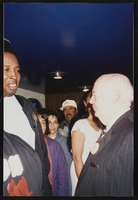Search the Special Collections and Archives Portal
Search Results
Medical Advisory Panel Project Report, 1949 July 22
Level of Description
Archival Collection
Collection Name: Human Radiation Experiments Records
Box/Folder: Box 01
Archival Component
Wilma Freemyer oral history interview
Identifier
Abstract
Oral history interview with Wilma Freemyer conducted by Suzanne Haag on February 22, 1979 for the Ralph Roske Oral History Project on Early Las Vegas. Freemyer discusses early Las Vegas, Nevada’s history during the 1930's and the
Archival Collection
Lincy Institute "Perspectives from the COVID-19 Pandemic" Oral History Project
Identifier
Abstract
The Lincy Institute "Perspectives from the COVID-19 Pandemic" Oral History Project contains transcribed interviews with Nevada leaders, interviewed for their perspective and experiences leading during and after the COVID-19 pandemic. These individuals include policymakers and elected officials, as well as leaders of government agencies, community organizations, businesses, and K-12 and higher education institutions.
Archival Collection
Lavell Jarrett oral history interview
Identifier
Abstract
Oral history interview with Lavell Jarrett conducted by Robert B. Grzywacz on February 22, 1975 for the Ralph Roske Oral History Project on Early Las Vegas. In his interview Jarrett discusses his early life in Utah and his career with the Union Pacific Railroad.
Archival Collection
Walter Zick oral history interview
Identifier
Abstract
Oral history interview with Walter Zick conducted by Maureen Kelly Ryan on February 22, 1977 for the Ralph Roske Oral History Project on Early Las Vegas. Zick discusses architecture and moving to Las Vegas, Nevada to work at the Basic Magnesium Plant.
Archival Collection
Voices from the Past: the Las Vegas Springs Preserve Oral History Project Interviews
Identifier
Abstract
The Voices from the Past: The Las Vegas Springs Preserve Oral History Project consists of nine interviews conducted by Joe Thompson in 2002 with community members, field experts, and politicians involved in the creation of the Springs Preserve, which opened in 2007. Interviewees include Claude and Liz Warren, John Mendoza, Richard Bryan, and others. Digital audio available; no transcripts available.
Archival Collection
Rotary Club of Las Vegas, Honoring Secretaries celebration, 1972 June 22
Level of Description
Archival Collection
Collection Name: Frank Mitrani Photographs
Box/Folder: Box 18
Archival Component
Vegas PBS Interviews for the African Americans in Las Vegas: a Collaborative Oral History Project
Identifier
Abstract
Oral history interviews with Ruby Amie Pilot, Eva G. Simmons, Melvin Sanders, Jarmilla McMillan-Arnold, Hannah Brown, Sonny Thomas, and Claytee White conducted by Vegas PBS on April 01, 2013, April 02, 2013, April 12, 2013, and November 19, 2013 for the African Americans in Las Vegas: a Collaborative Oral History Project. In these interviews, the participants discuss their early lives and moving to Las Vegas, Nevada. Pilot talks about segregation on the Las Vegas Strip, integration, and the importance of church activities in the African American community. Simmons describes her career as a teacher, the schools on the Westside, and businesses on Jackson Street. Thomas describes the funeral industry and his role as a funeral director. McMillan-Arnold talks about segregated Las Vegas, African American entertainers, and the issue of homelessness on the Westside. Brown remembers growing up on the Westside, segregated schools, and her role as President of the National Coalition of 100 Black Women – Las Vegas chapter. Lastly, Sanders discusses his childhood in Las Vegas, being the son of a preacher, and the redevelopment of the Westside.
Archival Collection
Maxson, Dr. Robert, University of Nevada, Las Vegas, 1991 January 22
Level of Description
Archival Collection
Collection Name: Frank Mitrani Photographs
Box/Folder: Box 53, Box 68
Archival Component

Meeting, Culinary Union, Las Vegas (Nev.), 1990s (folder 1 of 1), image 22
Date
Description
Image
